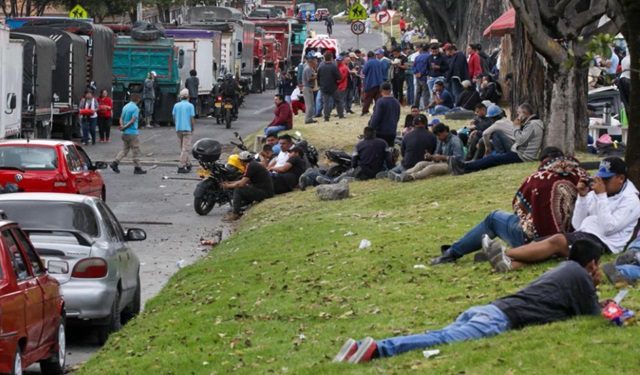BTN News: As the truckers’ strike in Colombia enters its fourth day, the impact on critical sectors like healthcare is becoming increasingly severe. Road blockades and protests across the country have paralyzed transportation, causing a significant shortage of essential medications and medical supplies. In response, the Association of Research-Based Pharmaceutical Laboratories (Afidro) has urgently appealed for the establishment of humanitarian corridors to ensure the delivery of life-saving medicines and patient access to healthcare facilities. With the situation worsening, the call for immediate action to protect public health grows louder.
Healthcare at Risk: Urgent Need for Humanitarian Corridors
The truckers’ strike, which began four days ago, has severely affected Colombia’s central, eastern, and southern regions. According to the Unit for Dialogue and Maintenance of Order (UNDMO), there have been 233 protests recorded just this Thursday, including 120 permanent roadblocks, 82 intermittent blockades, and 25 concentrated gatherings. These disruptions have critically impacted sectors such as agriculture and, more alarmingly, healthcare.
Afidro, a leading organization in the pharmaceutical sector, has made an urgent plea for humanitarian corridors to facilitate the delivery of medicines and transportation of patients. “Given the critical mobility issues across the country, we urge for the immediate creation of a humanitarian corridor to ensure the circulation of medicines and patients, protecting the fundamental right to health,” stated Afidro in a recent press release.
Medicines and Lives at Stake: Impact of Prolonged Blockades
With the blockades in place, the distribution of essential medicines, especially for patients with chronic conditions or those needing continuous treatment, has been severely hampered. Afidro highlighted the potential for a medical crisis if the current situation continues: “The availability of medications is crucial for protecting the lives and well-being of the population. We call for urgent measures to guarantee healthcare for patients and minimize the risk of shortages.”
The organization warns that the strike could lead to significant disruptions in medical services, potentially costing lives. The appeal was directed at both the government and the striking truckers, urging them to prioritize human life amid their ongoing negotiations. “We ask the government and transporters to join this humanitarian effort and consider the serious impact on patients, as lives are at risk,” added Afidro.
Rising Tensions: Blockades and Their Broader Impact on Society
The strike’s impact goes beyond healthcare. The agricultural sector is also experiencing delays in transporting goods, leading to concerns about potential food shortages in certain regions. The protests have mostly paralyzed the central, eastern, and southern parts of Colombia, where most road blockades have been reported. With negotiations between the government and truckers still unresolved, there is growing concern about the overall stability of essential services across the country.
A Call for Compassion: Appeals to Government and Transporters
As negotiations continue, Afidro’s urgent call for humanitarian corridors underscores the need for immediate, compassionate intervention. Ensuring that critical supplies and patients can move freely is not just a matter of policy but of life and death. “We encourage both the government and transporters to remember the human cost of this conflict and take swift action to establish safe, humanitarian routes for medical supplies and patient transport,” the organization stressed.
Conclusion: A Looming Crisis Demands Immediate Action
The Colombian truckers’ strike shows no signs of ending soon, and the consequences are escalating. From medication shortages to disrupted medical care, the impact on public health is dire. Afidro’s appeal for humanitarian corridors is a crucial step in addressing the growing crisis, but it requires swift action from both the government and the truckers to prevent further harm. As tensions remain high, the need to protect the fundamental right to health becomes more urgent than ever.


